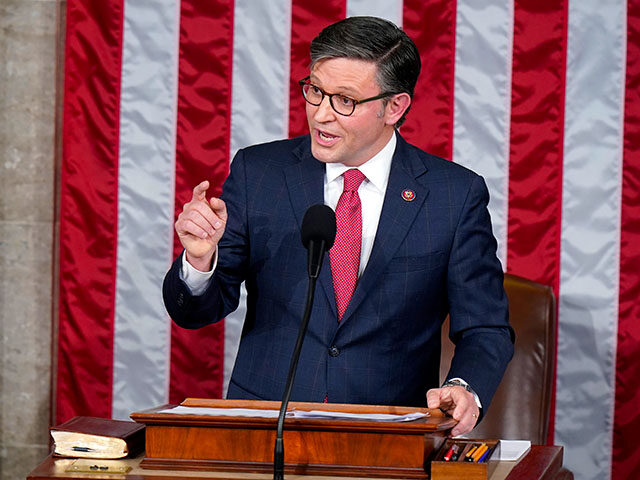House Speaker Mike Johnson (R-LA) floated a proposal Monday that would include aid to Ukraine and border security reform, while Senate Majority Leader Chuck Schumer (D-NY) hopes to have a vote on a bill tying Ukraine and the border to aid for Israel as soon as next week.
Negotiations around foreign aid continue to unfold on Capitol Hill as bipartisan support for Israel is abundant, but support for a Ukraine package is thin among conservative Republicans. However, Johnson, who oversaw the advancement of a standalone Israel aid bill with cuts to the Internal Revenue Service (IRS) in early November, indicated to reporters he was open to negotiations around a Ukraine bill that would also address problems at the southern border.
Speaking at a press conference in Sarasota Bradenton International Airport in Florida on Monday, which was captured by WFLA, Johnson told reporters that “negotiations are going on in earnest” with his counterparts in the Senate and that Israel and Ukraine are both priorities:
Listen, Israel is a top priority for the United States, and supporting our ally there is critical. It’s one of the first things we did. In fact, we passed the bipartisan Israel support package out of the House a while ago, right – not long after I took the gavel about a month ago. It’s been sitting in the Senate on Chuck Schumer’s desk, and so we are encouraging him to get that done. Ukraine is another priority.
Johnson added, “We can’t allow Vladimir Putin to march through Europe, and we understand the necessity of assisting there.”
However, in the Speaker’s view, aid for Ukraine would be contingent on reform to the border amid rampant illegal immigration under the Biden administration:
What we’ve said is that if there is to be additional assistance to Ukraine, which most members of Congress believe is important, we have to also work in changing our own border policy, and so there’s been a lot of thoughtful negotiation ongoing with that. I think most of our Senate colleagues recognize that those two things need to move together because we owe that to the American people.
While Johnson is floating a bill that addresses both the border and Ukraine aid — apart from the Israel aid that has already passed the House — Schumer and Democrats are seeking to bundle all three issues together along with aid for Taiwan. Schumer has said he would not take up the House’s Israel aid package, and Biden’s White House announced he would not sign it should it reach his desk.
In a letter to colleagues on Sunday, Schumer shared that he hopes to vote on a Senate package for Israel, Ukraine, Taiwan, and the border as soon as next week. He also informed his colleagues there would “be an all-Senators classified briefing in the coming days.”
“I urge every Senator to attend,” he added.
The framework for Schumer and Democrats bundles the same four issues that were at the center of the Biden administration’s aid request in October, which sought $61.5 billion from Congress for Ukraine, $23.5 billion for humanitarian and military aid for Israel, $7.4 billion for Taiwan, and another $13.6 billion for asylum officers and border patrol agents.
While giving an Oval Office address ahead of the official request, Biden likened Russian President Vladimir Putin to Hamas.
Biden says "The assault on Israel echoes nearly 20 months of war inflicted on the people of Ukraine, people really badly hurt, since Putin launched his all out invasion" before asking Congress for aid for both countries. pic.twitter.com/JWnxiGvK6f
— Greg Price (@greg_price11) October 20, 2023
“They both want to completely annihilate a neighboring democracy, completely annihilate it,” Biden said. “Hamas to sustain a purpose for existing is a destruction of the State of Israel and the murder of Jewish people.”
“Meanwhile, Putin denies Ukraine has or ever had real statehood. He claims the Soviet Union created Ukraine,” he added.
What Biden is doing is disgusting. He’s using dead children in Israel to sell his disastrous Ukraine policy to skeptical Americans.
They are not the same countries, they are not the same problems, and this effort to use Israel for political cover is offensive.
Hell no.
— J.D. Vance (@JDVance1) October 20, 2023
Politico’s Rachel Bade, Ryan Lizza, and Eugene Daniels noted Monday in Politico Playbook that “the White House is insisting that its multifaceted funding request move in one piece due to fears that separating out Israel funding — with its overwhelming bipartisan support — would mean letting the more controversial Ukraine aid languish.”

COMMENTS
Please let us know if you're having issues with commenting.